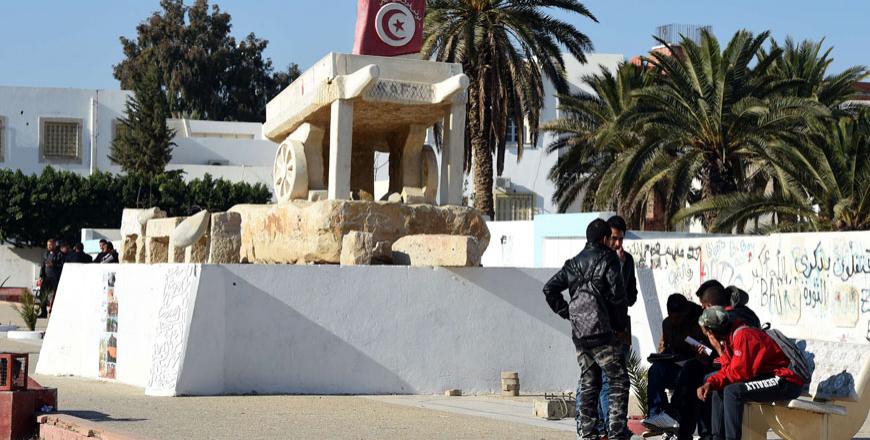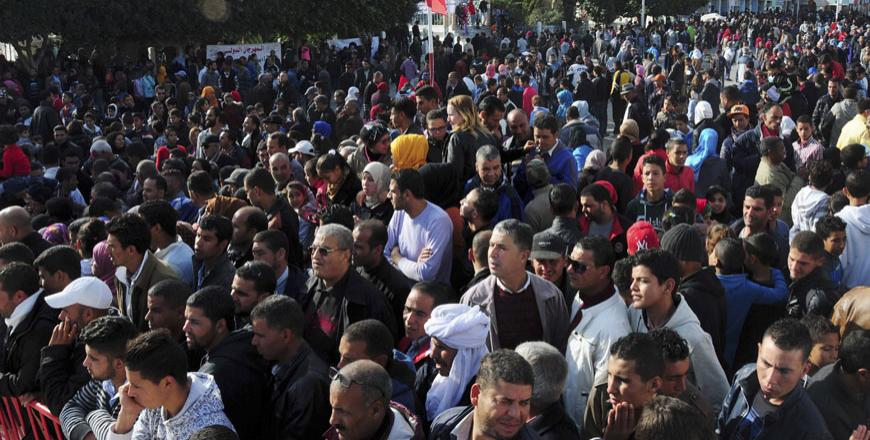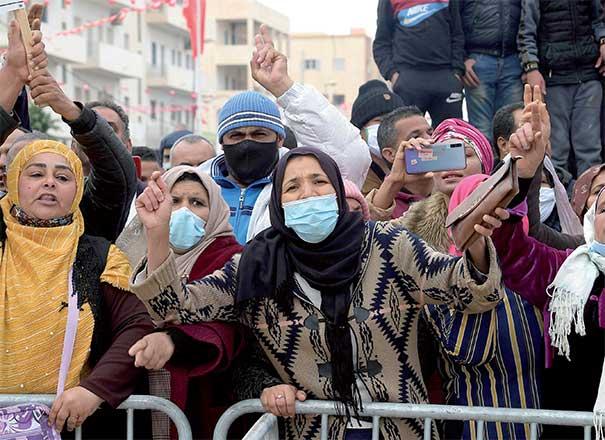You are here
Disillusion rife five years after Tunisia uprising
By AFP - Dec 16,2015 - Last updated at Dec 16,2015

Tunisian youths sit next to a sculpture featuring a cart and symbolising poverty on Mohamed Bouazizi Square on Monday, in the central town of Sidi Bouzid, three days ahead of the fifth anniversary of the self-immolation of Mohamed Bouazizi, a young street vendor, which sparked the revolution that ousted a dictator and ignited the Arab Spring (AFP photo)
SIDI BOUZID, Tunisia — A giant portrait of the Tunisian street vendor who started a revolution watches over the town where he set himself alight in a desperate act of protest. But five years later, pride has been replaced by disillusion.
"The revolution? This is what it brought me," said Nessim, showing his empty pockets to laughter from friends in Sidi Bouzid, epicentre of the revolt that touched off the so-called Arab Spring regional uprisings.
"Studying doesn't get you anywhere. So you have a choice between vocational training or construction work. In both cases you will still be despised by society," said the 20-year old, who is taking a course in refrigeration and air-conditioning.
On December 17, 2010, Mohamed Bouazizi, a 26-year-old university graduate who eked out a living as a fruit seller, torched himself to protest police harassment and unemployment.
His act, from which he died weeks later, ignited the 2011 revolt that toppled dictator Zine Al Abidine Ben Ali and spread to several other Arab capitals, bringing down other autocratic regimes.
On Thursday, the fifth anniversary of the start of the uprising, the authorities are due to lay the first stone of a "museum of the revolution" in Sidi Bouzid.
Tunisia, which held democratic elections at the end of last year, is often hailed as a rare success story of the Arab Spring.
But it faces a growing extremist threat and the economy is stuck in the doldrums.
Unemployment stands at more than 15 per cent.
About 32 per cent of young graduates are out of work — a figure that rises to more than 46 per cent in the Sidi Bouzid region of the neglected Tunisian interior, long overlooked for investment.
'Nothing has changed'
The freedom gained with the revolution "is good but it does not give us food", said a woman in her 50s who sells second-hand clothes and did not want to be identified.
Like many people, Mohamed Azri misses the Ben Ali era.
"I don't glorify the person but you have to admit that it was better before. My daughter graduated in fine chemicals but she hasn't found work. Sometimes I'm forced to sell a sheep to pay the bills," said the farmer.
"Nothing has changed. Prices have just increased."
Sidi Bouzid Governor Mourad Mahjoubi said he understood the disappointment.
"The people are right. They say 'I staged a revolution... mainly because of the inequality between regions, and still I don't see change'," he told AFP.
But you also have to take into account the exceptional circumstances that followed the revolution, he added.
Until recently, "we just managed daily life. It was impossible to plan and expectations were high”.
"This year, we started to plan for the short, medium and long term," he said, citing several major projects including highways linking the Sidi Bouzid region with Tunis and Sfax, the country's second largest city.
"In two or three years, we will start to feel the change," he said.
'We're afraid'
In the meantime, Tunisia is grappling with a growing extremist threat that has seen three major attacks claimed by the Daesh terror group this year targeting foreign tourists and security forces.
The beheading of a 16-year-old shepherd near Sidi Bouzid last month also horrified the country.
Extremists claimed responsibility for killing the teenager on behalf of Daesh, accusing him of informing the army about their movements, and forced his young cousin to take his head to the family.
"He was my pillar of strength and terrorism took him from me," said the shepherd's mother Zaara, who lives with her family at the foot of the mountain where her son was killed.
The authorities are building her a new house, just next to the two rooms without running water where she now sleeps on a thin mattress on the floor.
Work is also under way to build a proper road to the isolated hamlet, surrounded by olive trees and prickly pears.
"We're afraid, but we will not leave," said Jilani Soltani, a brother of the murdered youth.
Although a military truck sits on a nearby hill, Soltani wants a gun licence to "defend ourselves if the terrorists come down to our homes", he said.
Related Articles
SIDI BOUZID, Tunisia — Tunisia marked five years Thursday since the start of its revolution, with the prime minister vowing no return to "ty
SIDI BOUZID, Tunisia — Ten years since the intoxicating birth of Tunisia’s revolution, dreams for a better future lie crushed, and in the ru
TUNIS — Tunisian Prime Minister Habib Essid pleaded Saturday for people to be "patient" after a wave of protests against poverty and unemplo


















